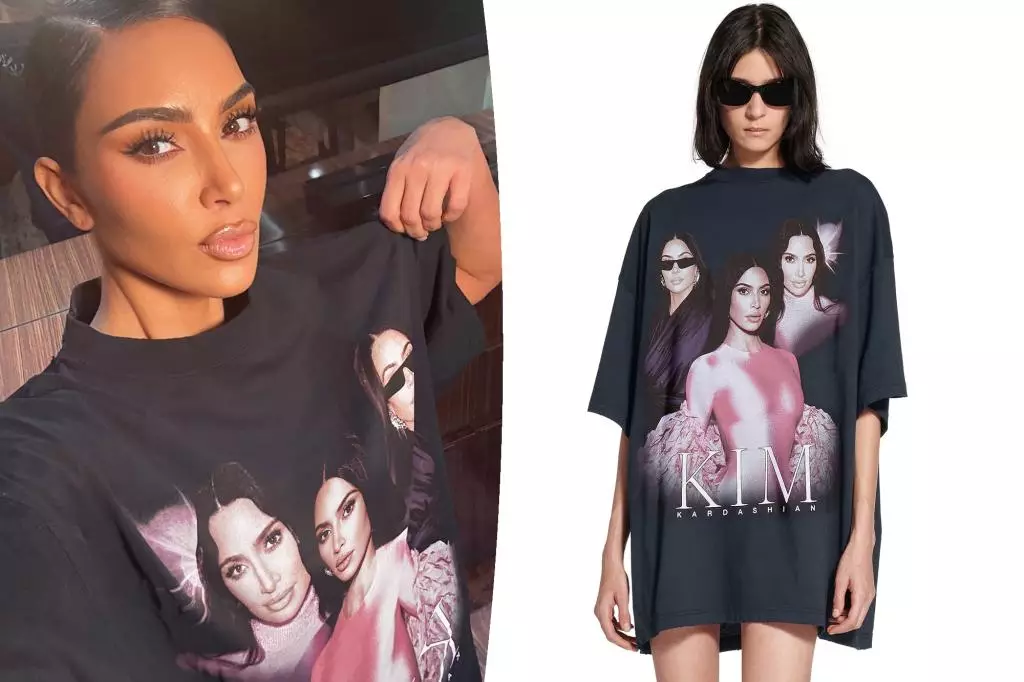In the ever-evolving world of fashion, few incidents attract as much scrutiny and debate as the recent launch by Balenciaga, a brand synonymous with avant-garde designs and celebrity endorsements. The luxury house recently unveiled a series of T-shirts featuring none other than Kim Kardashian, priced at a staggering $825. This release, however, comes laden with a complex backdrop that raises questions about ethics in the fashion industry. While the oversized black shirts display images of Kardashian in Balenciaga attire, they also prompt us to delve deeper into the implications of celebrity culture and brand accountability.
Kim Kardashian, a persistent figure in the media spotlight, garners widespread attention and admiration for her fashion choices. Balenciaga’s decision to feature her prominently is a calculated move to leverage her influence, especially considering her vast following on social media platforms. As exemplified by her recent Instagram post showcasing the T-shirt, the reactions from fans and celebrities alike were overwhelmingly positive. Esteemed personalities, including Paris Hilton and Amazon founder Jeff Bezos’ fiancée, Lauren Sánchez, expressed their desire for the shirt, reinforcing the notion that Kardashian’s endorsement is a powerful marketing tool.
Yet, the glitz of celebrity endorsements often masks deeper issues. The spectacle of social media interactions can overshadow the stark realities that surround the brands these celebrities support. In Balenciaga’s case, the excessive pricing of the merchandise also calls into question the accessibility of high fashion and its exclusivity. Are we merely watching the conspicuous consumption play out as a form of cultural commentary, or are we being seduced into accepting these outrageous prices as normative?
Balenciaga’s merchandise reveal does not occur in a vacuum; it carries the weight of previous controversies that have marred the brand’s reputation. Kardashian previously distanced herself from Balenciaga amidst a scandal involving the use of unsettling imagery in ad campaigns, including children’s toys depicted in a sexualized context. Her response was more than just a public relations move; it illustrated a broader concern about how brands navigate accountability and public perception in today’s hyper-connected world.
As a mother of four, Kardashian’s public statement expressed genuine outrage and disgust at the marketing strategies employed by Balenciaga. By openly questioning her relationship with the brand, she tapped into a wider movement advocating for ethical practices in the fashion industry. This pivot marks a critical juncture not only for Kardashian but also for Balenciaga, as they grapple with the fallout from their choices.
Despite her initial outrage, by April 2023, Kardashian re-embraced the luxury label, launching a broader conversation about celebrity loyalty. This phenomenon of shifting allegiances demonstrates the complexities behind brand partnerships. While fashionistas may argue that her return symbolizes a reconciliation of sorts, it also poses significant ethical dilemmas about endorsing brands that have been implicated in harmful cultural narratives.
The idea of re-evaluating one’s relationship with a brand based on ethical practices is not uncommon in the contemporary landscape, where consumers are increasingly scrutinizing the morality of their purchasing decisions. Fashion, as a reflective medium of cultural ethos, can no longer afford to ignore the societal implications of its messages.
Balenciaga’s recent T-shirt launch is not merely a celebration of luxury fashion; it is a critical lens through which we can examine the intersection of celebrity culture, ethical practices, and consumer responsibility. In an age where social media amplifies the voice of the public, the expectation for brands to engage in responsible marketing is paramount. Both celebrities like Kardashian and brands like Balenciaga have an opportunity to emphasize accountability and transparency, fostering a healthier relationship with their audiences.
The fashion industry stands at a crossroads, and its direction will be influenced by the voices of its most powerful figures and the consumers who demand change. As we continue to navigate the intricate world of fashion, let us hold space for authenticity, progress, and a commitment to ethical standards that benefit society at large.

